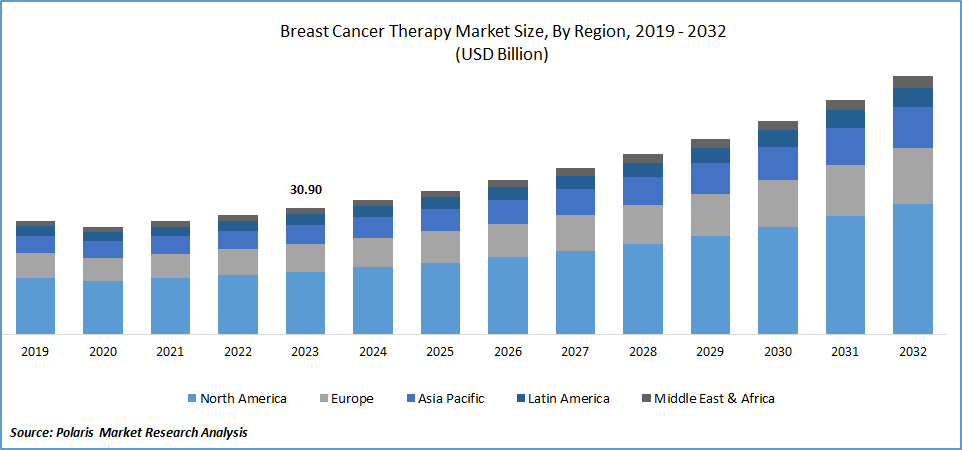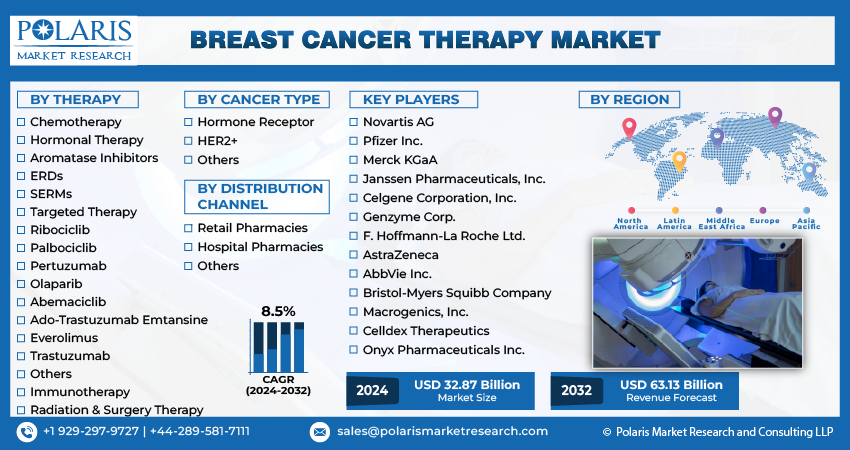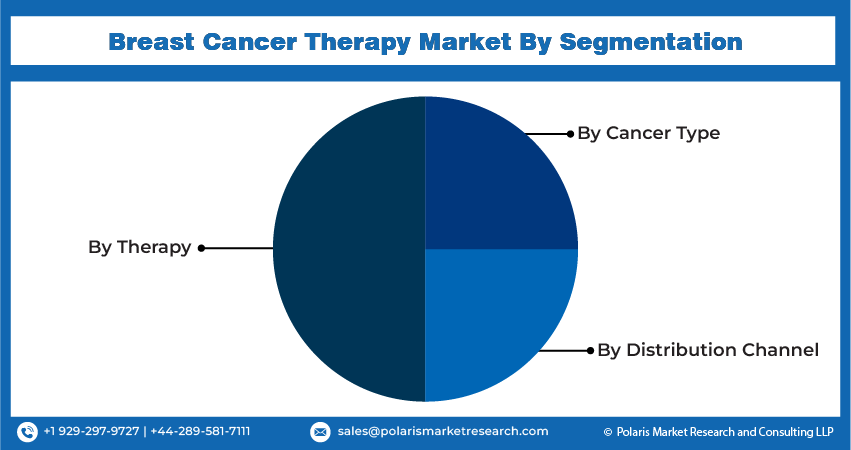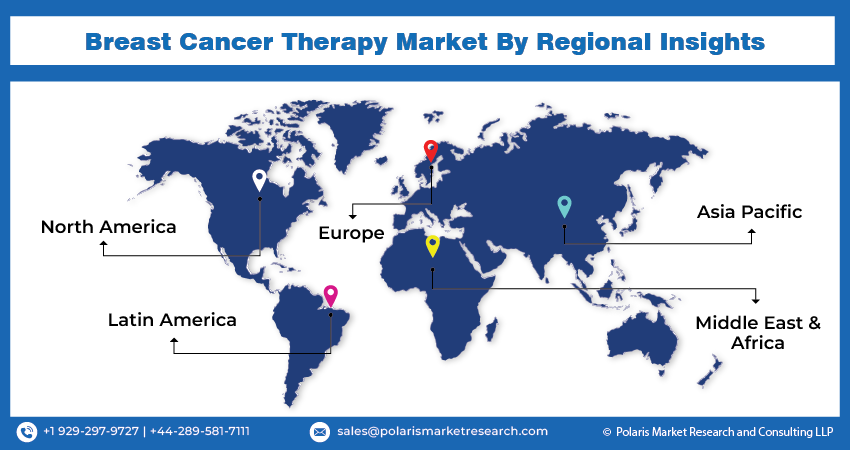
Breast Cancer Therapy Market Share, Size, Trends, Industry Analysis Report
By Therapy (Chemotherapy, Hormonal Therapy, Targeted Therapy); By Cancer Type; By Distribution Channel; By Region; Segment Forecast, 2025 - 2035
- Published Date:May-2025
- Pages: 163
- Format: PDF
- Report ID: PM1534
- Base Year: 2024
- Historical Data: 2021-2023
The global breast cancer therapy market was valued at USD 27.5 billion in 2024 and is anticipated to grow at a CAGR of 9.40% from 2025 to 2034. The market is driven by rising breast cancer incidence and advancements in targeted therapies.
Breast Cancer Therapy Market Overview
The breast cancer therapy market development is experiencing significant growth due to factors such as there is an increasing worldwide incidence of breast cancer, which is driving the demand for effective treatment options. This rise in incidence is attributed to various factors, such as aging populations, lifestyle changes, and environmental factors. Also, the technological advancements in treatment options, including targeted therapies, immunotherapy, and precision medicine, are revolutionizing breast cancer management. These treatments are tailored to individual patients based on their biomarkers and genetic profiles, leading to improved outcomes and reduced side effects compared to traditional methods.
For instance, in February 2024, Pfizer and Arvinas' Vepdegestrant breast cancer drug was granted fast-track status by the FDA. The drug is designed for the treatment of estrogen receptor-positive and HER2-negative metastatic breast cancer.

To Understand More About this Research:Request a Free Sample Report
Furthermore, the breast cancer therapeutics market opportunity is being propelled by strategic initiatives undertaken by pharmaceutical companies to develop targeted therapies tailored to specific types of breast cancer. These targeted therapies, which include hormone therapies, HER2-targeted therapies, and other molecularly targeted agents, offer more effective and less toxic treatment options compared to traditional chemotherapy. By focusing on specific molecular targets associated with cancer cells, these therapies can selectively kill cancer cells while sparing healthy cells, leading to improved outcomes and reduced side effects for patients.
Market Dynamics
Market Drivers
Increasing Worldwide Breast Cancer Incidence Rate
The increasing global incidence of breast cancer is anticipated to drive the breast cancer therapy market growth. Among women, breast cancer ranks as one of the most prevalent cancers worldwide and the second most common type overall. Cancer risk is often associated with aging, as the immune system becomes less effective over time. According to the Cancer Treatment Centers of America, women aged 60 and above are at a higher risk of breast cancer diagnosis, with only a small percentage occurring in women under 45. The American Cancer Society estimated approximately 279,100 new cases of breast cancer and around 42,690 related deaths in the U.S. in 2020. Additionally, Breastcancer.org reported that as of January 2020, over 3.5 million women in the U.S. were living with breast cancer.
Advancements in Personalized Medicine
In breast cancer, biomarkers such as progesterone receptor (PR), estrogen receptor (ER), and human epidermal growth factor receptor 2 (HER2) are crucial in determining treatment strategies. On the other hand, genetic testing involves analyzing DNA to identify mutations or changes in genes that may increase breast cancer risk or influence treatment decisions.
For instance, testing for mutations in the BRCA1 and BRCA2 genes can help identify individuals at higher risk of breast cancer and guide treatment decisions, such as using PARP inhibitors in patients with BRCA mutations. The use of biomarkers and genetic testing enables healthcare providers to personalize treatment plans for individual patients, known as personalized or precision medicine. This approach ensures that patients receive the most effective and least toxic treatments based on their unique genetic makeup and cancer characteristics, leading to better outcomes, reduced side effects, and improved quality of life for breast cancer patients.
Market Restraints
Patent Expiry is Expected to Hinder Market Expansion
The diminishing uniqueness of key products is anticipated to adversely affect a company's performance, compelling it to explore alternative revenue streams. Additionally, with governments increasingly prioritizing enhanced access to medications and a growing number of companies facing scrutiny over pricing, there is an expectation of further reductions in drug prices. This shift in focus, combined with heightened price scrutiny, presents challenges for pharmaceutical companies in maintaining profitability and sustainability in the market expansion. Consequently, companies are prompted to adapt their strategies and innovate to mitigate the impact of declining prices on their bottom line.

Report Segmentation
The market is primarily segmented based on therapy, cancer type, distribution channel, and region.
|
By Therapy |
By Cancer Type |
By Distribution Channel |
By Region |
|
|
|
|
To Understand the Scope of this Report:Speak to Analyst
Segmental Analysis
By Therapy Analysis
- The immunotherapy segment is projected to grow at the fastest CAGR during the breast cancer therapy market forecast period. Immunotherapy drugs, including checkpoint inhibitors, have demonstrated notable effectiveness in enhancing outcomes for individuals with triple-negative breast cancer. Additionally, vaccines designed to target particular proteins that are overexpressed in breast cancer cells are displaying promise in clinical trials. As research in this domain progresses, immunotherapy is expected to become a progressively crucial element of breast cancer treatment.
- The targeted therapy segment led the market with a substantial revenue share in 2024. The treatment landscape for HER2-positive and hormone receptor-positive breast cancers has undergone a significant transformation with the introduction of targeted medicines. Novel medications that target other cellular pathways involved in the growth and survival of breast cancer are also showing promise in clinical studies. Due to research and advocacy efforts by specialists from Duke University and Duke University Health System, targeted therapy for advanced and difficult-to-treat breast cancers received approval from the U.S. FDA in January 2023. One such newly licensed medication, elacestrant, addresses a critical need in the market. It is the first and only medication approved to specifically target breast tumors that may develop resistance to traditional endocrine therapy due to mutations in the estrogen receptor ESR1.
By Cancer Type Analysis
- The hormone receptor segment accounted for the largest market share in 2024 and is likely to retain its position throughout the breast cancer therapeutics market forecast period. Hormone therapy, which encompasses aromatase inhibitors, LHRH agonists, and SERMs, is commonly used to treat hormone receptor-positive breast cancer. Hormone receptors, such as estrogen receptors (ER) and progesterone receptors (PR), found on the surface of breast cancer cells, interact with the body's hormones to encourage the growth of these cells.
- The HER2+ segment is expected to grow at the fastest growth rate over the breast cancer therapy market forecast period. The market is expanding due to pharmaceutical companies increased strategic efforts to develop medications for HER2-positive cancer types. For instance, in February 2023, Gilead Sciences announced that the U.S. FDA had approved Trodelvy for a third indication. This approval provides patients with the most common type of breast cancer with an additional treatment option. Initially, Trodelvy was approved for use in patients with advanced breast cancer, particularly those with the HR-positive/HER2-negative subtype who had previously received at least two systemic therapies and no longer responded to hormone-based therapy.
By Distribution Channel Analysis
The hospital pharmacies segment is anticipated to hold a significant revenue share in 2023. Hospital pharmacies play a vital role in patient treatment, preparing and dispensing chemotherapy drugs and other treatments. They also manage the inventory and storage of these drugs, ensuring compliance with stringent regulations.

Regional Insights
North America Dominated the Global Market with the Largest Market Share in 2024
The North America breast cancer therapy market dominated with the largest market share in 2024 and is expected to maintain its dominance over the anticipated period. It can be attributed to factors such as the region experiencing a high incidence of breast cancer, creating a strong demand for effective treatment options. North America boasts a well-established healthcare infrastructure and access to advanced medical technologies, enabling early detection and swift treatment of breast cancer. Additionally, there is a significant emphasis on research and development in the region, resulting in the introduction of innovative therapies and treatment methods. Moreover, North America is home to a large pharmaceutical industry that develops and manufactures a diverse array of breast cancer therapies.
The Asia Pacific breast cancer therapy market is expected to be the fastest-growing region with a healthy CAGR during the forecast period. The region is experiencing rapid growth in the breast cancer therapy market due to several key factors. The primary driver is the increasing awareness of breast cancer and its treatment options among the population. This leads to more women seeking early detection and treatment, which in turn drives the demand for breast cancer therapies in the region.

Competitive Landscape
The breast cancer therapy market is fragmented and anticipated to witness competition due to several players' presence. Major therapy providers in the market are constantly upgrading their technologies to stay ahead of the competition and to ensure efficiency, integrity, and safety. These players focus on partnership, product upgrades, and collaboration to gain a competitive edge over their peers and capture a significant market share.
Some of the major players operating in the global market include:
- Novartis AG
- Pfizer Inc.
- Merck KGaA
- Janssen Pharmaceuticals, Inc.
- Celgene Corporation, Inc.
- Genzyme Corp.
- F. Hoffmann-La Roche Ltd.
- AstraZeneca
- AbbVie Inc.
- Bristol-Myers Squibb Company
- Macrogenics, Inc.
- Celldex Therapeutics
- Onyx Pharmaceuticals Inc.
Recent Developments
- In January 2025, the FDA approved AstraZeneca's Datroway (Dato-DXd) for treating advanced HR-positive/HER2-negative breast cancer after prior therapies. The approval, based on Phase III trial results showing a 37% lower progression risk, marks AstraZeneca's eighth new medicine toward its 2030 pipeline goal.
- In November 2023, AstraZeneca's Truqap (capivasertib) in combination with Faslodex (fulvestrant) has received approval in the US for treating adult patients with hormone receptor (HR)-positive, HER2-negative locally advanced or metastatic breast cancer with one or more biomarker alterations (PIK3CA, AKT1, or PTEN).
- In October 2023, Merck announced positive results for Keytruda in early-stage breast cancer. The phase 3 KEYNOTE-756 study has been assessing Keytruda in combination with chemotherapy as a neoadjuvant treatment for tumor removal surgery.
Report Coverage
The breast cancer therapy market report emphasizes key regions across the globe to provide users with a better understanding of the product. The report also provides market insights into recent developments and trends and analyzes the technologies that are gaining traction around the globe. Furthermore, the report covers an in-depth qualitative analysis pertaining to various paradigm shifts associated with the transformation of these solutions.
The report provides a detailed analysis of the market while focusing on various key aspects such as competitive analysis, therapy, cancer type, distribution channel, and their futuristic growth opportunities.
Breast Cancer Therapy Market Report Scope
|
Report Attributes |
Details |
|
Market size value in 2025 |
USD 30.09 billion |
|
Revenue forecast in 2034 |
USD 67.9 billion |
|
CAGR |
9.40% from 2025 – 2034 |
|
Base year |
2024 |
|
Historical data |
2020 – 2023 |
|
Forecast period |
2025 – 2034 |
|
Quantitative units |
Revenue in USD billion and CAGR from 2025 to 2034 |
|
Segments covered |
By Therapy, By Cancer Type, By Distribution Channel, By Region |
|
Regional scope |
North America, Europe, Asia Pacific, Latin America, Middle East & Africa |
|
Customization |
Report customization as per your requirements with respect to countries, region, and segmentation. |
FAQ's
The breast cancer therapy market size is expected to reach $ 27.5 billion by 2034
The top market players in the breast cancer therapy market include Novartis AG, Pfizer Inc., Merck KGaA, and Janssen Pharmaceuticals
North America is contributing notably towards the breast cancer therapy market.
During the forecast period, the breast cancer therapy market is expected to exhibit a CAGR of 9.40%.
The key segments covered in the breast cancer therapy market report are therapy, cancer type, distribution channel, and region.
